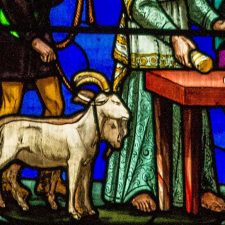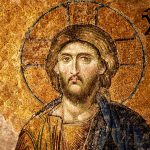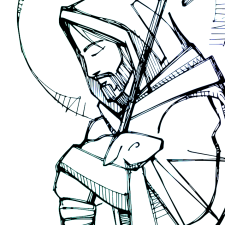Some claim the Bible contradicts itself by first stating that a crowd or mob came to arrest Jesus—per Matthew, Mark and Luke—but by the book of John, we’re told it was a cohort of Roman soldiers. Or, at least, this is what some teachers teach. I believe this is actually incorrect. I believe these soldiers weren’t Roman at all! So then, who were they?
In John 18:12, we’re told a “band of soldiers and their captain and the officers of the Jews arrested Jesus and bound him.” Many folks make the leap to these soldiers being Roman soldiers which, of course, might make sense because Israel was occupied by Rome at the time. Some even go further to say this was a Roman cohort, meaning as many as 200-600 Roman soldiers came to arrest Jesus! Yet, in the other Gospels, we’re told it was a crowd or a mob:
“And while He was still speaking, behold, Judas, one of the twelve, with a great multitude with swords and clubs, came from the chief priests and elders of the people.” (Matthew 26:47, Mark 14:43, Luke 22:47)
If we continue reading, notice Matthew 26:57: “And those who had laid hold of Jesus led Him away to Caiaphas the high priest, where the scribes and the elders were assembled.”
Now the first thing that should give us pause is the idea of Roman soldiers doing the bidding of the Jewish high priests. Likely? Definitely not. To the Romans, the Jews were a subjugated people. Roman soldiers were certainly not in the practice of answering the beck and call of Jews. As we see in Matthew, Rome would not be pulled into this drama until the morning after Jesus’ visit to Caiaphas’ palace; not until Matthew 27.
Notice, nowhere in John 18 does it mention Roman soldiers. Earlier, in verse 3, we’re actually told “Then Judas, having received a detachment of troops, and officers from the chief priests and Pharisees, came there with lanterns, torches, and weapons.” This is most certainly the Jewish Temple guard, established in the Old Testament, way back in 1 Chronicles 26. We already caught a glimpse of them in John 7:32: “The Pharisees heard the crowd murmuring these things concerning Him, and the Pharisees and the chief priests sent officers to take Him.” We see the Temple guard again in John 7:45-46 where “The officers came to the chief priests and Pharisees, who said to them, ‘Why have you not brought Him?’ The officers answered, ‘No man ever spoke like this Man!’”
Why Did the Soldiers Fall When Jesus Said “I Am He”?
I believe the soldiers’ identity as the Temple guard is further proven by their response to Jesus when He uses the name of God in reference to Himself in John 18, verse 6: “Now when He said to them, ‘I am He,’ they drew back and fell to the ground.” This same “fall to the ground” adverb (chamai) only appears two other times in Scripture: First, in Job 1:20, where Job falls to the ground in worship, and again in Daniel 2:46, where Nebuchadnezzar falls to the ground before Daniel.
Here, Jesus uses the Hebrew reference “I AM”, indicating the name of YHWH, the God of the Jews (Exodus 3:15). This name is not used lightly and the officers dedicated to Temple service would have had a proper reverence for this name. Roman soldiers—accustomed to worshiping a variety of gods, none of whom included the God of the Jews—would not likely have had this response.
Were Roman Soldiers Guarding Jesus’ Tomb?
In Matthew 27:62 through 66, we see the chief priests and Pharisees coming to Pilate to ask him to place guards over Jesus’ tomb so Jesus’ followers can’t steal His body away and perpetuate a resurrection myth. In verse 65, Pilate says to them, “’You have a guard; go your way, make it as secure as you know how.’ 66 So they went and made the tomb secure, sealing the stone and setting the guard.”
So, is this an image of Pilate agreeing to place a Roman watch over a Jewish tomb? Or is this simply Pilate telling the Jewish leaders to use their own Temple guard to watch over the tomb they are so concerned about? I believe this is the latter, and again—like my example of Jesus’ arrest in the garden of Gethsemane—I think the behavior of the soldiers indicates their origin.
In Matthew 28, we have an earthquake, an angel full of the glory of God announcing Jesus’ resurrection, and an empty tomb! Suffice it to say the guards watching over the tomb were freaked out! Do they run to Pilate? No! They run to the chief priests where they are paid to participate in a cover story. Verse 14 says, “If the report gets to the governor (Pilate),” so I think we can be fairly certain these soldiers had no direct report to Rome. I believe these were members of the Temple guard.
Giving Credit Where Credit Is Due
Well, you know, I’m not sure how Roman soldiers managed to get most the credit leading up to Jesus being handed over to Rome, and then again after. Maybe it’s because once Jesus was handed over, it was the Roman soldiers who scourged Him, escorted Him to Golgotha and crucified our Lord there.
In this talk, I’ve made the case for the Jewish Temple guard being more instrumental than they have historically been credited. I believe they were employed the night of Jesus’ arrest (just as they had already been charged once to do) and I believe it was the Temple guard—not Roman soldiers—who were watching over the tomb when Jesus raised from the dead.
I hope you enjoyed this teaching. Remember: It is the Truth that sets you free!
References
Long, Phillip J. November 16, 2014. The Arrest of Jesus (according to John 18). Reading Acts. Retrieved from https://readingacts.com/2014/11/16/the-arrest-of-jesus-according-to-john-18/.
Who are the soldiers in John 18:3? Biblical Hermeneutics. StackExchange. Retrieved from https://hermeneutics.stackexchange.com/questions/4598/who-are-the-soldiers-in-john-183.
Why did the soldiers go backward and fall down when Jesus said “I am he” in John 18:6? Christianity. StackExchange. Retrieved from https://christianity.stackexchange.com/questions/40655/why-did-the-soldiers-go-backward-and-fall-down-when-jesus-said-i-am-he-in-john.














D. A. Carson, 1991, says that SPEIRA (Gr.) refers to a Roman cohort but gives no sensical reason for it. He says that the Romans were at the Palace of the High Priest when Judas showed up and later went with the temple guards to arrest Jesus and then turned Jesus over to the Sanhedrin (?). Unbelievable!
Unbelievable indeed! Thank you for writing, Paul! Matthew
I thought your presentation was excellent up until this point;
“Update 3/23/23: The Temple guard is also seen in Acts 23:10, “And when there arose a great dissension, the chief captain, fearing Paul would be torn apart by them, commanded the soldiers to go down and take him by force from among them, and bring him into the barracks.””
There’s no way this is correct.
The Temple Guard delivers Saul/Paul from the Sanhedrin and delivers him to the Roman Barracks?
No way!
Mitch, I think you’re absolutely correct! When I look back at Acts 22, Paul is totally in Roman custody as he stands before the Sanhedrin. In 22:25, he is about to be flogged when he turns to the centurion and says, “Is it lawful for you to scourge a man who is a Roman citizen, and uncondemned?”
Thank you for the correction. I will remove the erroneous update. That’s what I get for hurrying! Thank you! Matthew
One further comment;
“Notice, nowhere in John 18 does it mention Roman soldiers. Earlier, in verse 3, we’re actually told “Then Judas, having received a detachment of troops, and officers from the chief priests and Pharisees, came there with lanterns, torches, and weapons.””
Though I disagree with the notion, here is where it probably comes from.
John 18:12 NASB
12 So the Roman cohort, the commander, and the officers of the Jews arrested Jesus and bound Him,
From Blue Letter Bible
King James Version
Jhn 18:12 Then the band and the captain
///G5506 Strong’s G5506 – chiliarchos
1. a chiliarch, the commander of a thousand soldiers
2. the commander of a Roman cohort (a military tribunal)
3. any military commander///
and officers of the Jews took Jesus, and bound him,
Thanks for writing, Mitch! Good call-out on this. You’re right, that teaching is probably coming from the NASB. Fortunately, it looks to me like the NASB is the outlier here, so I’ll stick with my current understanding on this one.
John 18:12
ESV: So the band of soldiers and their captain and the officers of the Jews arrested Jesus and bound him.
KJV: Then the band and the captain and officers of the Jews took Jesus, and bound him,
NIV: Then the detachment of soldiers with its commander and the Jewish officials arrested Jesus. They bound him
RSV: So the band of soldiers and their captain and the officers of the Jews seized Jesus and bound him.
Who cares?
The whole point of the scripture was pointing out the power of God.
Jesus said “I AM” and everyone was forcefully knocked to the ground.
No one took him by force, he went willingly.
Great lesson.
I knew that temple guards arrested Jesus and included that in a children’s book I wrote.
But now I believe I was in error thinking the Roman soldiers guarded His tomb.
Thanks for this clarification.
I’m pleased to have found your lessons via Google search and look forward to seeing more.
If no Romans were at the arrest of Jesus in the Garden, why does John mention these as the ones who apprehended Jesus. A band, minister of the Jews, and a tribune, by definition a Roman official. John 18:12?
Pilate records in his defense in the Archko Volume, Jesus was dragged before the High Priest first, “that would be the Jewish soldiers then” He also says he did not have but a handful of old career soldiers, and was denied by Syria for additional. He liked and defended Jesus for 3 years of preaching, and when he was dragged before him again from Herod, He was not one to want to harm him. He came from Herod then, most likely still temple soldiers. He stayed behind when he says the hellish mob went off to crucify him, and he stayed behind and wept with those left, including Joseph who was granted to bury Jesus. He indicated that the next days the Jews now wanted a guard due to the possible resurrection, so Pilate indicated he sent the Jewish guard, so that if anything happened it would be on their own heads. It seems fairly clear in reading these authentic documents, Pilate had no recourse and did not participate in the arrest and death but was forced to allow the Jews to bypass their temple death sentence procedures and haul him off to death. He washed his hands, said no after having him whipped and offering a release. A few of his band went with the crowd to try to keep order, but this whole show was run by the three primary Jewish power groups at the time, now united against Jesus after his three years of convicting them directly.
So basically I would agree with you in this article, that it was not the Romans but primarily the Jewish soldiers. Good work.